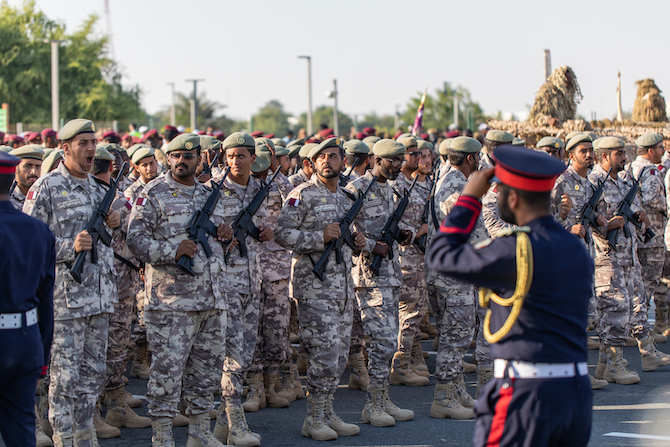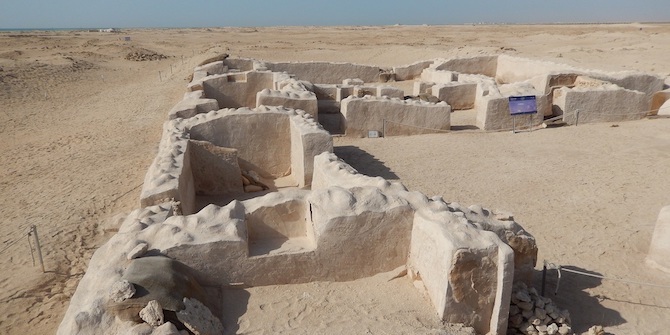by Eleonora Ardemagni

In recent years, the military has become a matter of unprecedented importance in the social and political spheres of the Gulf monarchies, especially the UAE, Qatar and Saudi Arabia. This top-down phenomenon has long been a powerful tool of nation-building. In fact, ‘militarised nationalism’ is an everyday performative strategy to connect the concepts, values and symbols of the military domain with the overarching notion of heritage, in this case a process activated and guided by politics to produce long-term outcomes. In today’s Gulf monarchies, militarised nationalism can be defined as a system of military-related values promoted ‘from above’, including symbols, collective experiences, role models and memoirs, aimed to foster sense of national belonging and cohesion ‘from below’.
In so doing, the Gulf’s ruling elites are now crafting the intangible national heritage of tomorrow. These governments are promoting new national myths for still-young states (particularly Qatar and the UAE) with increasing young societies. These citizenries need to recognise themselves as part of contemporary and collective experiences of nationhood: a process which often also incorporates the display of military-related values and symbols.
For instance, vectors of militarised nationalism include the introduction of compulsory military service for male nationals (while it is voluntary for women) in the UAE (2014), Qatar (2013) and Kuwait (2017), military museums and exhibitions, military parades and uniformed displays during National Days, martyrs’ commemorations for soldiers killed while serving abroad, patriotic poetry and songs, and public speech (by royals, politicians, religious figures and the media) stressing the need for national strength through patriotic commitment. These are top-down initiatives designed not only to foster a bottom-up response from society, but also to craft the intangible heritage of tomorrow through shared meanings and experiences. Nationals are the main, but not exclusive, targets of this strategy: in fact, militarised nationalism allows outreach also vis-à-vis expatriates residing in the Gulf monarchies (as in the case of National Day celebrations), reiterating their community loyalty without addressing the highly-sensitive issue of citizenship.
Among the Gulf monarchies, Oman has followed a different path, in some ways anticipating the militarised nationalism trend. In fact, Sultan Qaboos bin Said Al Said was not only the Sandhurst-educated leader who decisively contributed to build a national identity for Omanis with varied backgrounds: especially since 1970s onwards, recruitment in the Sultan’s Armed Forces (SAF) has also performed as a vector of national socialisation. In Saudi Arabia, the Janadriya National Festival of Heritage and Culture, held annually since 1985, is organised by the Saudi National Guard (SANG). This has been a pioneering event of militarised nationalism with the SANG performing the role of cultural agent, displaying camel races, folk dances and tribal poetry, and thus depicting the Bedouin heritage (bedu turath) as a distinct feature of Saudi identity.
Nowadays, two traumatic events have triggered the rise of the politics of militarised nationalism in the Gulf monarchies: the Saudi and Emirati-led military intervention in Yemen (started in 2015) and the diplomatic crisis with Qatar resulting in the boycott and the blockade (beginning in 2017). The conflict in Yemen has represented a real turning point: from a nation-building perspective, Saudi Arabia and the UAE have tried to link this first-ever war beyond their borders with the promotion of national awareness and identity. This was the case, for instance, with cultural production praising soldiers and the public mourning of ‘martyrs’ who died abroad while serving the nation.
For the UAE and Saudi Arabia, the shaping of a national military ethos, enhanced by the intervention in Yemen, offers the possibility to also strengthen centre-periphery relations: most of the Emirati soldiers deployed (and most of those who died) in the conflict came from the northern emirates of Ajman, Ras al-Khaimah, Umm al Quwain and Fujairah, while over half of the Saudi forces serving (and falling) in Yemen come from the southern regions, especially Jizan, as outlined by Yasmine Farouk. Both are peripheral areas far from power centres, with a high concentration of nationals but lower development indicators with respect to the national average; moreover, these regions host confessional communities and political groups with dialectic relations with the ruling power (the south of Saudi Arabia is mostly inhabited by Ismaili Shi’a, and the Muslim Brotherhood has traditionally found support in the UAE’s northern emirates). As a product of ruling elites, militarised nationalism supports also the promotion of, respectively, Abu Dhabi- and Najd-centred national identities, thus downplaying regional expressions of heritage.
Due to the diplomatic crisis with its Gulf neighbours, Qatar adopted militarised nationalism to show state resilience and to display self-reliance vis-à-vis the boycott. This enhanced the presence of military symbols in Qatari everyday politics, boosting nationalism: for instance, the military parade organised for the 2018 National Day was larger and longer than the previous ones and conscription was extended in 2018 to one year. Unlike its neighbours, Kuwait presents an understated version of this trend, since it lessened the display of military symbols and rhetoric after the traumatic invasion by Iraq’s Saddam Hussein in 1990.
In the framework of social engineering theories (as brilliantly outlined by Calvert Jones in her research on the UAE), the politics of militarised nationalism also functions to promote new models of citizenship complementing socio-economic structural changes. Nowadays, paradigms of citizenship in the Gulf monarchies are oriented to community responsibility: they stress the role of duty, service, sacrifice and patriotism – which are military-related values – but can serve also to boost both social entrepreneurship and spirit of adaptation. Not by chance, this vocabulary is now common to the labour-oriented national service programs activated in most of the Arab monarchies (included Jordan and Morocco), regardless of the presence of conscription.
Finally, the rising politics of militarised nationalism in the Gulf monarchies impacts upon ‘heritage’ in two ways. First of all, heritage is the product of a sophisticated, participatory but top down-driven process which always has a political dimension, especially in authoritarian settings. Therefore, it can be advanced by ruling elites to achieve strategic goals, thus consolidating regime security. Secondly, heritage is not only the legacy of the past, but can be intended also as a work in progress, and a long-term investment for the future: a way to (re)produce the Nation by projecting new identity myths for tomorrow.
This is part of a series emerging from a workshop on ‘Heritage and National Identity Construction in the Gulf’ held at LSE on 5–6 December 2019. Read the introduction here, and see the other pieces below.
In this series:
- Introduction by Courtney Freer
- Souvenir Sovereignty in Qatar by Suzi Mirgani
- Examining Kuwait National Museum by Sundus Alrashid
- Urban Planning and its Legacy in Kuwait by Alexandra Gomes
- Museums as Political Institutions of National Identity Reproduction: Are Gulf States an Exception? by İdil Akıncı
- The New Populist Nationalism in Saudi Arabia: Imagined Utopia by Royal Decree by Madawi Al-Rasheed
- Heritage and Sectarianism in Bahrain by Thomas Fibiger
- Dubai Expo 2020 and Ancient Mercantile Heritage by Robert Mogielnicki
- Managing UNESCO World Heritage Sites in Saudi Arabia: Contribution and Future Directions by Abdulelah Al-Tokhais
- Finding Mariam: The Invisible Woman in Kuwait’s National Heritage Mythology by Alanoud Al-Sharekh
- Cultural Attendance: Attracting the Crowds to Museums in Saudi Arabia by Maha al-Senan
- Religion and Heritage in the Gulf: Significant in its Absence? by Courtney Freer
- Historical Archaeology in the Gulf by Robert Carter
- The Practice of Heritage in the Northern United Arab Emirates by Matthew MacLean
- Displaying the Nation in Museum Exhibitions in Qatar by Alexandra Bounia
- Implicit and Explicit Cultural Policies in Qatar: Contemporary Art Production and Censorship by Serena Iervolino
- The UAE State ‘Rebirthing’ of Motherhood: Who is birthing who? by Rima Sabban







3 Comments